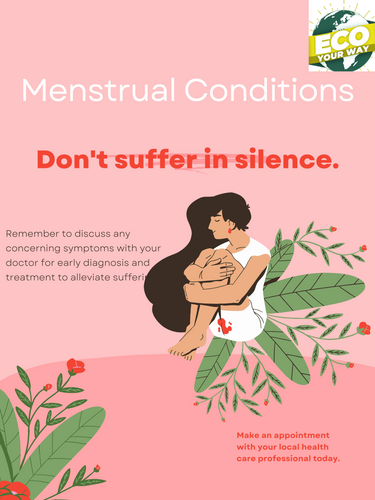Navigating Period Care for Women with PCOS, Heavy Periods, Irregular Periods, and Other Menstrual Conditions
Aug 17th 2024
Menstruation is a natural aspect of women’s health, PERIOD! According to the National Institute of Health (NIH), up to 25% of reproductive-aged women have irregular and heavy periods. For those with conditions like Polycystic Ovary Syndrome (PCOS), heavy periods, irregular periods, and other menstrual disorders, managing period care can be particularly challenging. Alarmingly, up to 70% of affected women remain undiagnosed worldwide, according to the World Health Organization (WHO). Understanding menstrual conditions, their prevalence, and effective management strategies is crucial for maintaining well-being and quality of life.
There are other conditions that affect your period as well including endometriosis, adenomyosis, and uterine fibroids. Uterine fibroids are common growths of the uterus (Mayo Clinic). We will discuss these in upcoming articles.
Understanding Menstrual Conditions
There are many women who have more than one of these menstrual conditions. Having one or several menstrual conditions is difficult, but with knowledge and care, you can manage. and continue to function effectively. Here are some of the more prevalent menstrual conditions women of reproductive age suffer from.
Polycystic Ovary Syndrome (PCOS)
PCOS is a common endocrine disorder affecting up to 12% of women in their reproductive years. It is characterized by a combination of symptoms, including but not limited to irregular or absent menstrual periods, elevated levels of male hormones (androgens), and polycystic ovaries. Women with PCOS often experience infrequent or prolonged menstrual cycles, which can further complicate period care.
Heavy Periods (Menorrhagia)
Heavy periods, or menorrhagia, refer to menstrual bleeding that is unusually heavy or prolonged. It affects about up to 10% of women and can lead to significant discomfort and even anemia if left unmanaged. Heavy bleeding can be caused by various factors, including hormonal imbalances, uterine fibroids, or other underlying health conditions.
Irregular Periods
Irregular periods are characterized by cycles that are inconsistent in timing or length. This condition is common and can be a symptom of several issues, including hormonal imbalances, thyroid disorders, or stress. While occasional irregularity is often normal, persistent irregular periods can indicate an underlying problem that requires attention.
Other Period-Related Conditions
Other conditions include endometriosis, adenomyosis, and fibroids, which can also affect menstrual health. Endometriosis occurs when tissue similar to the lining of the uterus grows outside it, causing severe pain and irregular bleeding. Adenomyosis is similar but involves the lining growing into the uterine wall. Uterine fibroids are non-cancerous growths in the uterus that can cause heavy bleeding and discomfort.
How to Manage Menstrual Conditions
Surviving menstrual conditions like PCOS, heavy periods, and irregular cycles can be challenging, but with the right and consistent strategies, you can manage them effectively. Effective management of menstrual conditions involves a combination of medical treatment, lifestyle adjustments, and appropriate menstrual products. Here are some best practices for managing period care across these conditions:
Consult a Healthcare Provider
The first step in managing any menstrual condition is to consult with a healthcare provider. They can diagnose the specific issue and recommend appropriate treatments. For PCOS, treatment might include hormonal therapies or lifestyle changes. Heavy periods might require medications like hormone therapy or tranexamic acid, while irregular periods may be managed with birth control pills or other hormonal treatments. Please do not hesitate to seek medical advice for personalized treatment options.
Track Your Cycle
Keeping track of your menstrual cycle can help in understanding patterns and identifying irregularities. Various apps and journals are available to help track menstrual flow, cycle length, and symptoms. This information can be valuable for healthcare providers in diagnosing and managing your menstrual condition(s).
Use the Right Menstrual Products
Use menstrual products that suit your needs, such as organic cotton pads or menstrual cups, to ensure comfort and reduce irritation. Choosing the right menstrual products is crucial for comfort and effectiveness.
Menstrual Cups
Reusable menstrual cups can hold more fluid than pads or tampons, making them a good option for heavy periods. They also help reduce waste and can be worn for up to 12 hours.
Pads
For heavy periods, opt for super-absorbent and eco-friendly pads. Consider those with added features like sturdy wings for extra protection. Eco Your Way sanitary pads for heavy periods are leak-proof, comfortable, and designed to hold more than other leading brands, while keeping your dry.
Tampons
Many women find tampons comfortable to use during their periods. If you’re interested, consider researching which type of tampon would be best suited for you.
Period Underwear
Period underwear is designed to absorb menstrual flow and can be a comfortable and eco-friendly option. They are particularly useful for light to moderate flow and as a backup for heavier days.
Maintain a Healthy Lifestyle
Lifestyle changes can have a significant impact on managing menstrual conditions.
Diet
Start by maintaining a balanced diet rich in nutrients to support hormonal balance and overall health. A balanced diet rich in fruits, vegetables, whole grains, and lean proteins can help regulate menstrual cycles and manage symptoms. For those with heavy periods, iron-rich foods may help combat anemia.
Exercise
Regular exercise can help alleviate symptoms and improve your mood. Regular physical activity can help balance hormones and alleviate menstrual symptoms. For women with PCOS, exercise can also assist in managing weight and improving insulin sensitivity.
Self Care and Stress Management
Stress can exacerbate menstrual issues, so incorporating stress-reducing techniques like yoga, meditation, or deep breathing exercises can be beneficial. Remember, self-care and patience are key to navigating these conditions with resilience and grace. Remember to stay hydrated and get plenty of rest to combat fatigue.
Explore Medical Treatments
Depending on the severity of the condition, various medical treatments might be recommended.
Hormonal Treatments
Birth control pills, patches, or hormonal IUDs can regulate menstrual cycles and reduce heavy bleeding. Hormone therapy is often used for managing PCOS and irregular periods.
Non-Hormonal Medications
For heavy bleeding, medications like tranexamic acid or desmopressin may be prescribed to reduce blood loss.
Surgical Options
In cases where other treatments are ineffective, surgical options such as endometrial ablation (for heavy periods) or laparoscopy (for PCOS or endometriosis) might be considered.
Support and Education
Educating yourself about your condition and seeking support from community groups or online forums can be invaluable. Connecting with others who have similar experiences can provide emotional support and practical advice. and consider joining support groups to connect with others who understand your experiences.
Conclusion
Managing period care for women with PCOS, heavy periods, irregular periods, or other menstrual conditions involves a comprehensive approach. By understanding the specific condition, consulting with healthcare providers, tracking menstrual cycles, choosing appropriate products, maintaining a healthy lifestyle, and exploring medical treatments, women can better manage their symptoms and improve their overall quality of life. Empowering oneself with knowledge and support is key to navigating the complexities of menstrual health with confidence and resilience.

